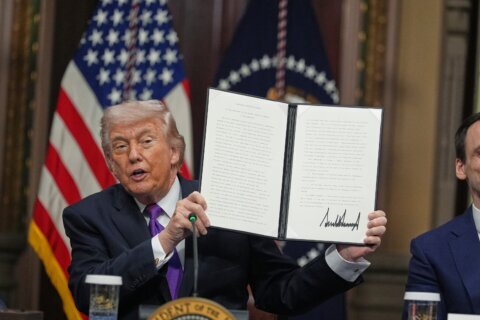Virginia Gov. Glenn Youngkin on Thursday issued an executive order designed to combat a shortage of teachers in the commonwealth.
The executive order lays out several steps aiming to make it easier for people to obtain teaching certifications, as well as for retired teachers and those from other states to teach in Virginia classrooms.
At the signing of the order, at Colonial Forge High School in Stafford, Youngkin said the combination of a teacher shortage in Virginia and learning losses during the COVID-19 pandemic “makes one sad to think that we have a generation of students who, in fact, aren’t fully prepared, haven’t been able to benefit from the great opportunities that Virginia’s education system can provide.”
He added, “When a student is in the classroom with a teacher, in person — that’s where the magic happens.”
He called the order a step to eliminate “as many obstacles as we can to address this near-term challenge” of a lack of teachers, as well as a first step toward creating a larger new generation of teachers.
“We have to bring multiple solutions to bear,” Youngkin said. “There’s no silver bullet in anything.”
Among the provisions of Youngkin’s order:
- All teaching positions in Virginia will be classified so that retired teachers can fill them.
- Legislative proposals will be developed to “reduce red tape associated with teacher licensure” so that the state can recruit more out-of-state and retired teachers, along with “career switchers, military veterans and other professionals with much to offer students.”
- Grants for teacher recruitment and retention bonuses targeted to divisions with high vacancy rates, as well as targeting such incentives toward “previously filled positions,” rather than those established through federal pandemic relief money.
- A registered teacher occupation apprenticeship program to license new teachers and paraprofessionals.
- Support for childcare inside schools for teachers and other local families — “they have lives too,” Youngkin said of teachers.
Asked whether the actions he’s taken in his first year in office — including starting an investigation of the Loudoun County school system, a tip line for people to report teachings they disagree with, a move to eliminate teaching materials that some parents groups have falsely labeled critical race theory — might dissuade people from wanting to teach in Virginia, Youngkin pointed to the budget he signed, which called for a 10% raise for teachers over two years, and said, “Teachers should feel so confident that in Virginia, we support them.”
That said, he added that teaching kids requires a team of teachers, parents and administrators, and “I feel like parents have been pushed out of that team over the last few years. And we want to put them back at the at the point of that team.”
Reactions
James Fedderman, president of the Virginia Education Association, said in a statement Thursday afternoon that the reasons for the teacher shortage “aren’t a mystery to anyone who’s been paying attention: Our teachers are not only underpaid, but do their jobs under almost unbearably difficult working conditions. They don’t get the respect they deserve and they aren’t given the resources they need to most effectively serve our students.”
He said the executive order “certainly has some ideas we can support,” but that educators have offered “solid solutions” including competitive salaries; more aid to high-poverty schools; a lifting of the “support cap” which limits the amount of money spent on support staff, and fully funding the Standards of Quality set by the Virginia Board of Education.
“Our current budget surplus could be used effectively to solve this problem, which affects all Virginia’s citizens,” Fedderman said. “By what he decides to do with those funds, our governor will show us if he truly values education and solving our teacher shortages.”
Former secretary of education Atif Qarni told WTOP teacher shortages were due to the “ongoing attacks on public education, “from COVID to CRT to curriculum.” He said “most things listed in the executive order are not new initiatives and pale in comparison to what the Northam administration did to support children, teachers and public education.”
WTOP’s Neal Augenstein contributed to this report.








